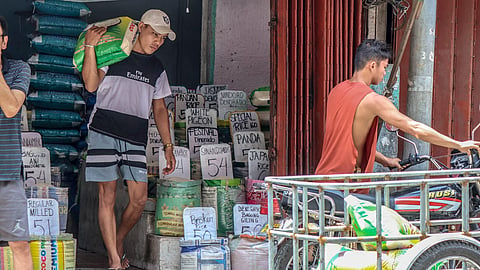
- HEADLINES
- NEWS
- PAGE THREE
- COMMENTARY
- BUSINESS
- LIFE
- ACTION
- GLOBAL GOALS
- SNAPS
- DYARYO TIRADA
- AIF
- MORE

The Marcos administration's long-desired cheap rice would possibly materialize in July, but only in certain parts of the country, Speaker Martin Romualdez said Monday.
"We are confident that it is possible to offer rice below P30 per kilo as early as July this year. The Department of Agriculture is currently identifying the areas where affordable, well-milled rice will be made available to the public," Romualdez said.
The House chief made the announcement following a meeting with Agriculture Secretary Francisco Tiu Laurel Jr., key officials of the National Irrigation Administration (NIA), and agencies affiliated with the DA, who took part in a congressional hearing on proposed bills seeking to amend Republic Act 11203 or the Rice Tariffication Law (RTL).
Romualdez, however, said the P30 rice will reach all parts of the country once amendments to the five-year-old RTL, including allowing NFA to sell rice again in the market, finally hurdle Congress.
The bill is poised to get the swift green light of the Malacanang as President Marcos Jr. announced that he would certify it as urgent.
Laurel said the P30 per kilo rice will be sold at certain Kadiwa stores beginning in July but only five days a week since its operation will still depend on the rice supply available to the NFA.
"Gradually, we aim to increase the number of Kadiwa centers across the country with assistance from local government officials. Many have volunteered to provide public spaces for these centers," he added.
Due to RTL's implementation, NFA is not allowed to participate in the government's Kadiwa program, which sells basic commodities at a much lower price.
Enacted in February 2019 during the Duterte administration, the RTL also pulled out the market of cheaper NFA rice, which was then sold at P27 per kilo.
The RTL also abolished NFA's powers to regulate the rice sector, license market players, inspect warehouses, and track stock movements while liberalizing rice importation.
Critics of the RTL claimed that NFA's function had been paralyzed only to buffer the stocking of palay, which could only be sold to the LGUs during calamities.
The House Committee on Agriculture and Food has been holding marathon hearings since last week to amend, if not repeal, the RTL in light of the skyrocketing price of rice, currently pegged at P55.12 and P49.44 for local premium and well-milled, respectively.
The current costs of rice are still significantly distant from Marcos' target of lowering the price of the staple grain to P20 per kilogram.
Marcos' allies in the House are aiding him in attaining his campaign promise by allowing the NFA anew to enter domestic markets to spark increased competition with commercial traders-- a move that would drive down rice prices.
In early April, the DA announced that the price of rice would remain high until July owing to the impact on the agriculture sector of El Niño, which is expected to persist until May.
